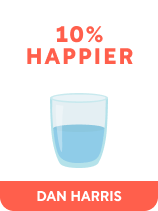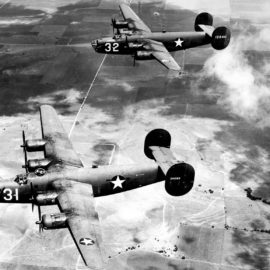

This article is an excerpt from the Shortform book guide to "10% Happier" by Dan Harris. Shortform has the world's best summaries and analyses of books you should be reading.
Like this article? Sign up for a free trial here .
What caused Dan Harris’s panic attack on a 2004 episode of Good Morning America? In what ways did the attack impact Harris’s life?
Dan Harris is a self-help writer who is famous for his book 10% Happier. But Harris didn’t always have it together. Before his writing career, Harris was a news correspondent who suffered a panic attack on live tv. In his book, he details the lead-up to the traumatic event and what he learned from it.
Keep reading to learn about Harris’s fight against anxiety and ego.
His Career in News
Before Dan Harris’s panic attack, he began his career at a local station in Bangor, Maine. He worked his way up the ranks, eventually landing at ABC News. He describes the news environment as competitive and fast-paced: Journalists compete with each other for air time, and they work on tight deadlines to quickly deliver trending news to the audience. Bosses and producers are often critical and difficult to please.
Harris’s career took off following his coverage of the 9/11 attacks. Soon afterward, he was sent to report from Afghanistan. While he was there, he went behind enemy lines and interviewed Taliban leaders. He became an international correspondent and was repeatedly put into stressful situations, where he saw dead bodies, witnessed the wreckage of bombed cities, and dodged gunfire.
(Shortform note: Harris doesn’t discuss it in the book, but he also covered stories on Hurricane Katrina in 2005. The hurricane devastated the southeastern part of the United States, causing over 1,800 fatalities and billions of dollars in damages. This is yet another major event Harris covered that propelled his career, while also subjecting him to witness hardship.)
Harris was ambitious, working hard to cover important stories. He thought if he began to feel comfortable in his job, he wouldn’t keep pushing himself to succeed. He also worried excessively, letting his mind run through worst-case scenarios and potential outcomes. At the time, he believed this kind of worrying helped him in his career by predicting outcomes so that he could make strategic professional moves and achieve his ultimate goal, which was to transition from working as a correspondent—where journalists compete for air time with individual news stories—to becoming a successful news anchor, where journalists have guaranteed air time. However, his competitiveness made him quick to anger, and he developed a reputation for having outbursts on set.
(Shortform note: According to a 2002 study, there’s a name for the worry Harris experienced: career anxiety. It can be broken down into two components: learning anxiety and survival anxiety. Learning anxiety occurs at the start of a new job or when learning a new skill—it’s the anxiety of trying something new and potentially failing in the process. Survival anxiety occurs when you’re settled in your job and worry about your long-term career success. Generally, when your survival anxiety outweighs your learning anxiety, experts advise that it’s time to look for a new, better job.)
Harris explains that his work exposed him to traumatic events, but he didn’t consider the psychological impact of covering these traumatic events. He convinced himself that he experienced these events with psychological distance that was appropriate and normal, but in truth, the things he witnessed affected him deeply. After returning home to the US, he started experiencing unexplained health problems, which a doctor finally diagnosed as depression. The doctor prescribed antidepressants, but instead, Harris self-medicated with illegal drugs.
Harris later discovered research that found a correlation between war correspondents and post-traumatic stress disorder (PTSD), which he realized was part of what was troubling him during this period.
| Effects of Trauma Harris’s news coverage of traumatic events had psychological consequences without him realizing it. We often equate PTSD and trauma with war veterans, abuse survivors, and victims of violent accidents, but trauma is more common than we realize. One study found that almost 70% of young people have experienced some kind of trauma. As we see in Harris’s case, trauma can stem from a range of experiences, and it impacts the mind, brain, and body. In The Body Keeps the Score, Bessel van der Kolk explores the physical effects of trauma. Van der Kolk describes how even small triggers can cause a fight-or-flight response in trauma victims. This constant hypervigilance can manifest in the body and hinder the victim’s social and emotional health. Additionally, trauma is often misdiagnosed as mental illnesses like depression and anxiety—and that misdiagnosis can worsen negative effects. Treatment for trauma includes therapy, support groups, medication, and physical experiences like yoga and eye movement desensitization and reprocessing (EMDR). |
His On-Air Panic Attack
Because of the stress of his work, Harris started partying and using hard drugs to cope. He describes how he juggled both of his addictions: drugs and journalism. He notes that his drug usage added to his stress at work: He worried that if people found out about his problem, he’d be fired. This caused him to obsess over when he could and couldn’t use drugs, making him more stressed, which resulted in more drug usage. After years of drug use, he developed frequent chest pain and fatigue.
All of these factors—his career anxiety, traumatic news coverage, and drug use—culminated in a panic attack on a nationally televised news program. He was filling in for a newsreader on “Good Morning America,” an assignment he hoped would be a step toward his goal of becoming a news anchor. But midway through his report, he felt his lungs tighten, he had difficulty speaking, and he felt panicked. He was unable to get through his delivery and had to turn the story over to his co-hosts.
Harris felt ashamed about the incident and worried that it would negatively impact his career. Soon after, he consulted a psychiatrist, who confirmed the earlier diagnosis of depression and prescribed anti-anxiety medication to prevent more panic attacks. Harris started taking the medication but also continued partying and using drugs. A year later, Harris had a second on-air panic attack that mirrored the first one. He realized that if he couldn’t control his panic, even while on prescription medication, something needed to change or his career was in jeopardy.
Harris then sought the advice of a second therapist, who helped him quit his drug problem and recognize that he needed to change his habits and take care of both his body and his mind.
| Crises and the Search for Meaning Harris’s on-air meltdown served as a catalyst for him to change his behavior. Many other self-help books and fables explore this theme of crises and the search for meaning. It often takes a sudden, unexpected emergency for people to seek change and meaning in their lives. -In The Monk Who Sold His Ferrari, Robin Sharma tells a parable about Julian, a once successful lawyer, and the lessons he learned from his spiritual journey. During a trial, Julian suffered from a heart attack, sparking his self-improvement journey. -In When Breath Becomes Air, Paul Kalanithi’s lung cancer diagnosis sparked his journey of self-discovery as he struggled to understand the meaning of life and death. -In The Miracle Morning, Hal Elrod discusses how a devastating car accident—that stopped his heart for six minutes—changed his life. He realized the only thing to do when encountering adversity is to focus on having a fulfilling life going forward. He chose to be grateful for what he had and take responsibility for creating the life he wanted. |
His Recognition of Ego
After battling with career anxiety, trauma from journalism, drug use, and on-air panic attacks, Harris continued to go to therapy and eventually found himself in a more stable position in his career. However, while he felt he had managed to get his troubles somewhat under control, he didn’t yet feel truly secure at work or comfortable in his mentality. Harris explains that it was at this time that he came across philosophies outlining people’s relationship with their own egos, a line of thinking that helped him recognize what was holding him back from psychological healing.
At his coworker’s recommendation, Harris bought a copy of A New Earth: Awakening to Your Life’s Purpose by Eckhart Tolle. Tolle’s thoughts on what our ego is and how it affects our behavior had a big impact on Harris’s thinking, helping him to see how he could move beyond the various problems he had accumulated.
Tolle defines our ego as our internal voice or narrator. Tolle’s definition of ego differs from many people’s typical understanding of ego, as he doesn’t define it as pride or arrogance. Nor does he define it in the way that Freudian psychiatrists do, as the part of our psyche that regulates our emotions. Instead, Tolle defines ego as our use of “I”: It’s how we talk to ourselves about ourselves, others, and the world around us.
Tolle notes that, often, this inner voice is negative, causing us to be judgmental and insensitive. Unless we are mindful and aware of our egos, our thoughts and actions are driven by this negative internal voice, which is the source of much of our unhappiness and stress in our lives.
(Shortform note: In The Inner Game of Tennis, Timothy Gallwey expands on an idea similar to Tolle’s definition of ego. Gallwey writes that when people talk to themselves, there is a disconnect between the “I” talking and the “self” listening. He distinguishes between two selves: Self 1 and Self 2. Self 1 is our ego-driven mind that chastises or praises Self 2, which is our physical self that acts intuitively. We succeed when we can quiet Self 1 and allow Self 2 to act.)
Harris suspected many of his problems stemmed from his ego, as Tolle defines it.

———End of Preview———
Like what you just read? Read the rest of the world's best book summary and analysis of Dan Harris's "10% Happier" at Shortform .
Here's what you'll find in our full 10% Happier summary :
- A skeptic’s journey through the world of self-help
- How to control your anxiety, manage your ego, and become more compassionate
- How you can improve your life and career—even by just 10%






